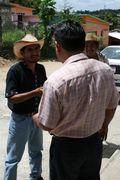Throughout 2007 in Guerrero, social and human rights organizations have denounced a lack of dialog and attention to conflicts and social demands by the government led by Zeferino Torreblanca Galindo. In many cases the response has been repression and incarceration of social and human rights leaders, thus worsening the conflicts and failing to attend to the root of the problems that are behind the demands.
On November 8, 2007, José Manuel Olivares Hernández, director of the "José María Morelos y Pavón" Regional Human Rights Center and well known human rights defender (see previous PBI Mexico Newsletter, number 22, Summer 2007), was documenting police abuses during a protest lead by the Chilapa Citizen's Council in which protesters demanded that the municipal president follow through with public works that she had promised in her campaign. The municipal assistant gave the order to detain Olivares: "detain this jerk that is causing us problems." Olivares Hernández argumented that he was only doing his job in defending human rights and that he was not participating in the blockade, to which he got the response that "I don't give a shit." The protesters were beaten up and 15 of them, along with leader Virginio Vázquez Pileño, were arrested. On November 9, they were released on bail, and although they were all accused of the same crimes (attacks to communication networks, criminal association, and rioting), Olivares Hernandez's bail was much higher than that of the other detainees.
On August 9, David Valtierra Arango, leader of Radio Ñomndaa, the indigenous community radio station in the municipality of Xochistlahuaca, was detained and accused of kidnapping. This accusation came from a decision made in a community assembly in 2004 to detain a farmer that illegally took ownership of land that did not belong to him - there are eight other arrest warrants out for the same crime.4 On October 13, Cirino Plácido Valerio, founder and councilman of the Regional Coordination of Community Authorities (Community Police), was detained and accused of kidnapping, abuse of authority, and usurping functions, all of which allegedly were committed in 2005. These indigenous organizations are branded as criminals for exercising their right to freedom of expression through the use of the radio, and for applying their own system of norms to achieve justice in their communities.
On October 19 Cándido Félix Santiago was arrested and accused of attacking communication networks. This was his fourth detention this year; he has also been accused of riot and kidnapping. Félix Santiago, leader of the Regional Council for the Development of the Me'Phaa People who speak the Bathaa dialect, has led a series of protests since 2006 to demand the fulfillment of agreements that have already been signed with the Government and the Department of Education of Guerrero (SEG) which would send bilingual teachers to 17 Me'Phaa communities that speak the Bathaa dialect in the Montaña region.
Finally, the last few months have been marked by conflict between students that have graduated from the Rural Teachers School in Ayotzinapa "Raul Isidro Burgos" with the SEG and the governor. A series of protests began in August to demand more teaching positions for the graduates, and that the program for Certification in Primary Education be continued. Finally, students and the government came to a partial agreement on December 22; these months have been marked by a lack of attention to the demands of the students and strong police repression. On November 14, state riot police evicted, beat, and violently detained protesters that were outside the state Congress; more than 200 were injured. On November 30, while distributing propaganda on the highway that enters Acapulco, the students were repressed by the Federal Preventative Police - 56 students were detained and one person was seriously injured.
Local organizations have stated that a lack of dialog has caused the organizations to take actions such as occupying public spaces or blocking highways so that their demands could be heard and attended. As a result, the state has "used this moment to place them outside the law, using the public institutions like the State Attorney General's Office to negatively apply the law to social leaders for political motives."

